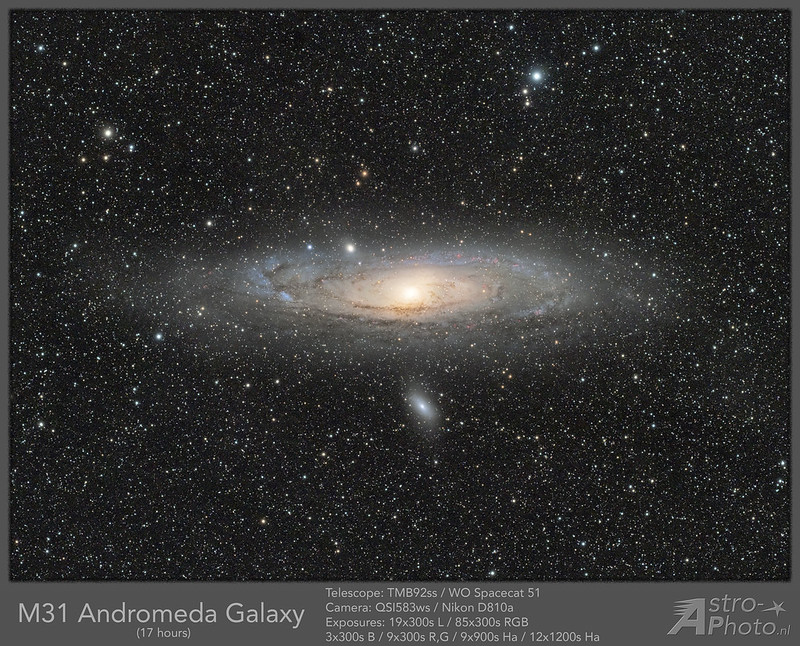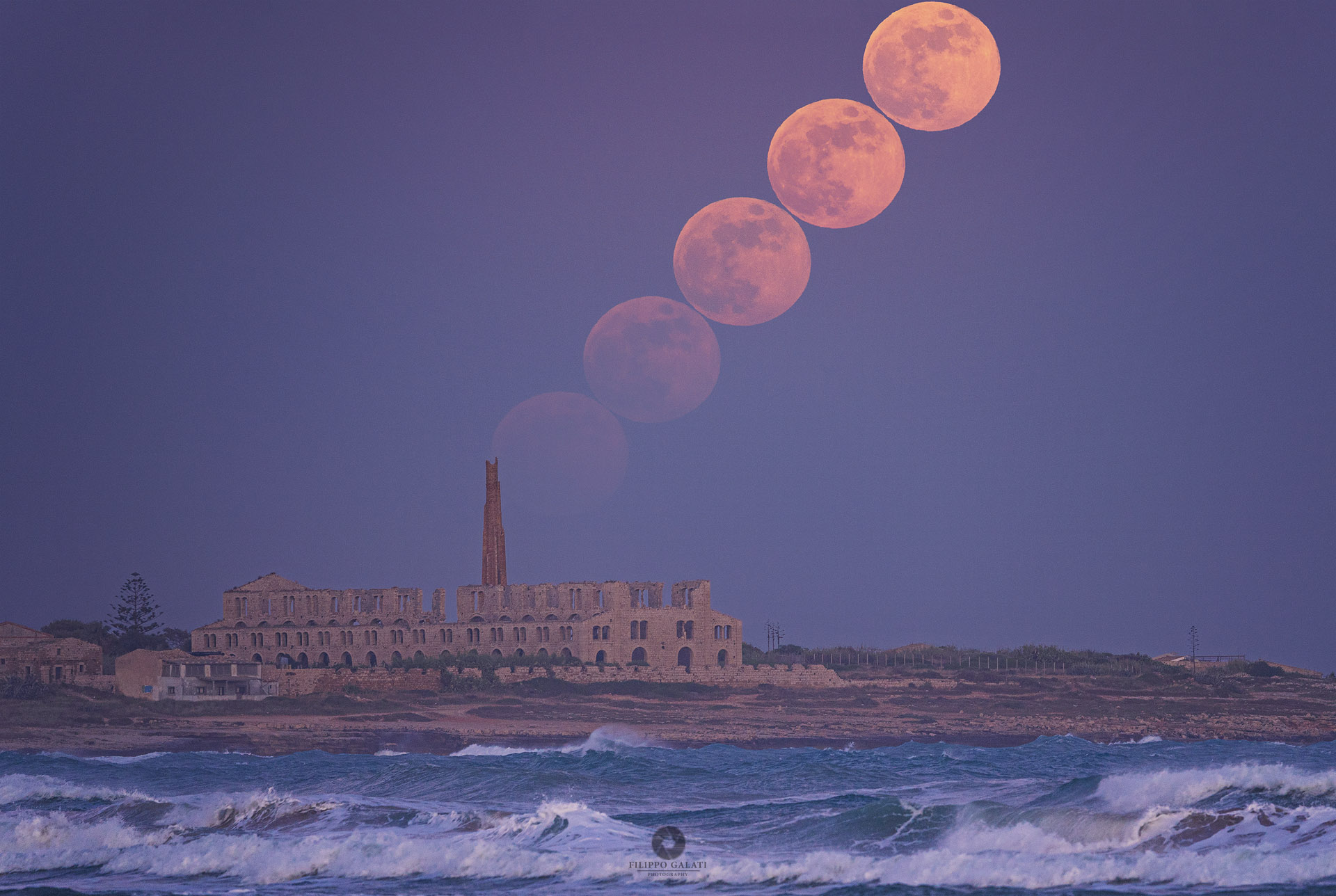Page 4 of 6
Re: Submissions: 2020 September
Posted: Sat Sep 19, 2020 2:05 pm
by Llama
The giant interacting galaxies NGC 6872/IC 4970
Copyrights
Data acquisition:
Martin PUGH
Processing:
Nicolas ROLLAND
Total acquisition time of 25 hours.
Optics: Planewave 17“ CDK @ F6.8
Mount: Paramount ME
CCD: SBIG STXL-11002 (AOX)
Pre Processing: CCDstack & Pixinsight
Post Processing: Photoshop CC
 The giant interacting galaxies NGC 6872/IC 4970
The giant interacting galaxies NGC 6872/IC 4970 by
Nicolas Rolland, sur Flickr
Re: Submissions: 2020 September
Posted: Sat Sep 19, 2020 5:08 pm
by Tom Glenn
ISS transit of Mars
 ISS transit of Mars, September 14, 2020
ISS transit of Mars, September 14, 2020 by
Tom Glenn, on Flickr
This image was linked in my
previous submission, but wasn't officially submitted itself. Based upon some feedback I've received, many seem to prefer this composite image, so I am submitting it here.
The International Space Station (ISS) transits Mars in this image. This is a composite image of individual frames extracted from a video of the event, and represents approximately 0.4s of elapsed time. Details on both the ISS and Mars are visible, despite the short exposure, including Syrtis Major on Mars. The orbital trajectory was calculated by Calsky.com, and the transit was only visible along a 90m wide corridor along the ground, leaving a margin of error of about 45m on each side of the centerline. The image was captured northeast of San Diego, CA, at exactly 05:15:47 local time (PDT) on September 14, 2020, and more information and data (including the raw exposure sequence) is available in the following video linked below:
https://youtu.be/oHcMvF-nP2s
Equipment used:
C9.25 Edge HD telescope
ASI183mm camera (no filter)
Focal length: 2350mm
Exposure: 0.35ms
Gain: 300 (66%)
ROI: 5496x1500 pixels
Frame rate recorded: 41 fps
Re: Submissions: 2020 September
Posted: Sat Sep 19, 2020 9:46 pm
by Gregorio Montero Gil
NGC 7000 - The Wall
Data acquisition: Gregorio Montero
Processing: Gregorio Montero
Total acquisition time of 6.6 hours.
Optics: TS 100 Q f 5.8
Mount: NEQ 6 Pro
CCD: Atik 460 Mono
Ha 24x600 seconds.
O III 8x600 seconds.
S II 8x600 seconds.
Processing: Pixinsight
https://live.staticflickr.com/65535/503 ... 131c_o.png
https://www.flickr.com/photos/137933566 ... 348905401/
Mars occultation, images and time-lapse
Posted: Sun Sep 20, 2020 9:18 pm
by Thierry Legault
September 6, 2020: The Moon occults Mars. In Europe, one must go to the southwest of the Iberian Peninsula to observe the occultation before sunrise.
I prepare for the event as if it were a solar eclipse.
I take a flight to Lisbon with the C8 in my backpack and I decide to settle near Alcacer do Sal to take advantage of a grazing occultation: the lunar disc will "eat" the red planet while leaving its north pole visible.
Thus, Mars will reveal the rounded shape of the limb on the dark side of the Moon, as visible in the composite image:
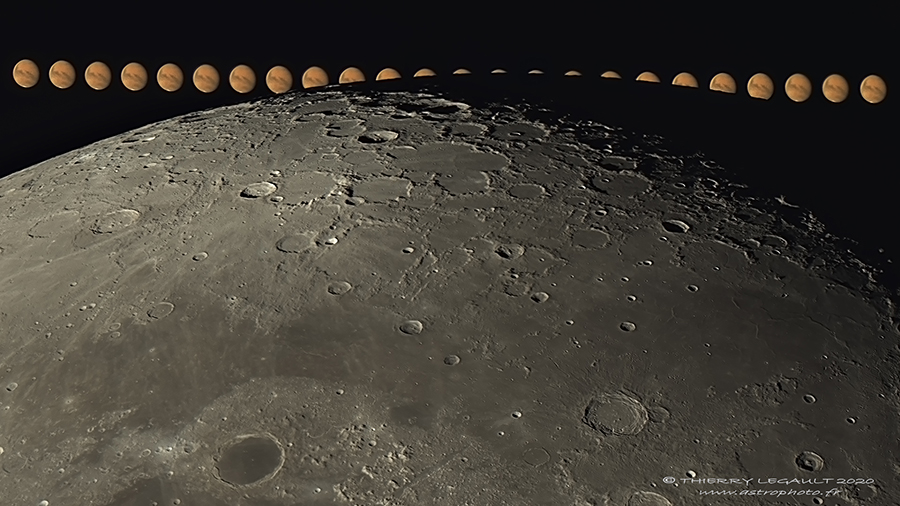 Larger version: http://www.astrophoto.fr/mars_occultati ... 906_fb.jpg
Larger version: http://www.astrophoto.fr/mars_occultati ... 906_fb.jpg
And the time-lapse: https://youtu.be/XnF4N8Jbyhk
The processing of the 400 video sequences of 4s each and their registration on Mars required several tens of hours of work!
Re: Mars occultation, images and time-lapse
Posted: Mon Sep 21, 2020 9:52 am
by Ann
Thierry Legault wrote: ↑Sun Sep 20, 2020 9:18 pm
September 6, 2020: The Moon occults Mars. In Europe, one must go to the southwest of the Iberian Peninsula to observe the occultation before sunrise.
I prepare for the event as if it were a solar eclipse.
I take a flight to Lisbon with the C8 in my backpack and I decide to settle near Alcacer do Sal to take advantage of a grazing occultation: the lunar disc will "eat" the red planet while leaving its north pole visible.
Thus, Mars will reveal the rounded shape of the limb on the dark side of the Moon, as visible in the composite image:
 Larger version: http://www.astrophoto.fr/mars_occultati ... 906_fb.jpg
Larger version: http://www.astrophoto.fr/mars_occultati ... 906_fb.jpg
And the time-lapse: https://youtu.be/XnF4N8Jbyhk
The processing of the 400 video sequences of 4s each and their registration on Mars required several tens of hours of work!
Great picture, Thierry. I'm very impressed at the enormous amount of work that went into producing it.
Ann
Re: Submissions: 2020 September
Posted: Mon Sep 21, 2020 11:49 am
by barretosmed
My solar system  Best details:
Best details:
https://www.astrobin.com/full/9o5sgk/0/
EQUIPAMENTS:
Sun: asi 174 + esprit 150mm + daystar cromosphere
Mercury and Vênus : asi 290mc + Meade 10” + PoWermate 2.5x
Moon: asi 6200 + esprit 150mm + PoWermate 2x
Mars, Jupiter , Saturn = asi 462mc + Meade 10” + PoWermate 2.0x
Uranus and Neptune= asi 290mc + Meade 10” + PoWermate 2.5x
São Paulo - SP -Brazil
Copyright: Fernando Oliveira de Menezes
Email::
Barrtosmed@hotmail.com
Re: Submissions: 2020 September
Posted: Mon Sep 21, 2020 9:01 pm
by avdhoeven
Re: Submissions: 2020 September
Posted: Mon Sep 21, 2020 11:20 pm
by KuriousGeorge
Starburst Galaxy IC10.
KG Observatory, Julian, CA
My second project with the new ZWO ASI6200M Pro – this time with 2x2 binning for smaller sub size (30 MB vs 120 MB) and higher SNR. The 2X loss of resolutions is not really noticeable. (-:
Camera gain was fixed at 100 with 60s Luminance subs and 300s RGB and Ha subs. Several hours of luminance subs were discarded in favor of the best FWHM.
Ha was applies over the LRGB with a starless screened overlay to help highlight the vigorous star-forming regions.
Fortunately the great positioning of IC10 allowed me to capture lots of subs – 9 hours per day from 8:30 PM to 5:30 AM over 3 days. Before that we had 8 days of high-altitude smoke from the CA fires. Skies were very dark, but just a handful of visible stars.
"Lurking behind dust and stars near the plane of our Milky Way Galaxy, IC 10 is a mere 2.3 million light-years distant.
Even though its light is dimmed by intervening dust, the irregular dwarf galaxy still shows off vigorous star-forming regions that shine with a telltale reddish glow.
IC 10 is the closest known starburst galaxy. Compared to other Local Group galaxies, IC 10 has a large population of newly formed stars that are massive and intrinsically very bright, including a luminous X-ray binary star system thought to contain a black hole.
Located within the boundaries of the northern constellation Cassiopeia, IC 10 is about 5,000 light-years across."
https://www.astrobin.com/jq2i75/
M17
Posted: Tue Sep 22, 2020 1:47 am
by aldomottino
Ha (CCD mono) and RGB (CMOS color)
Taken independently from Buenos Aires and Rosario urban skies and combined.
Copyright: Omar Mangini and Aldo Mottino.
Thanks for looking!
Re: Submissions: 2020 September
Posted: Tue Sep 22, 2020 5:41 am
by Ann
KuriousGeorge wrote: ↑Mon Sep 21, 2020 11:20 pm
Starburst Galaxy IC10.
KG Observatory, Julian, CA
My second project with the new ZWO ASI6200M Pro – this time with 2x2 binning for smaller sub size (30 MB vs 120 MB) and higher SNR. The 2X loss of resolutions is not really noticeable. (-:
Camera gain was fixed at 100 with 60s Luminance subs and 300s RGB and Ha subs. Several hours of luminance subs were discarded in favor of the best FWHM.
Ha was applies over the LRGB with a starless screened overlay to help highlight the vigorous star-forming regions.
Fortunately the great positioning of IC10 allowed me to capture lots of subs – 9 hours per day from 8:30 PM to 5:30 AM over 3 days. Before that we had 8 days of high-altitude smoke from the CA fires. Skies were very dark, but just a handful of visible stars.
"Lurking behind dust and stars near the plane of our Milky Way Galaxy, IC 10 is a mere 2.3 million light-years distant.
Even though its light is dimmed by intervening dust, the irregular dwarf galaxy still shows off vigorous star-forming regions that shine with a telltale reddish glow.
IC 10 is the closest known starburst galaxy. Compared to other Local Group galaxies, IC 10 has a large population of newly formed stars that are massive and intrinsically very bright, including a luminous X-ray binary star system thought to contain a black hole.
Located within the boundaries of the northern constellation Cassiopeia, IC 10 is about 5,000 light-years across."
https://www.astrobin.com/jq2i75/
That's a superb image! Thank you!

Ann
Re: Submissions: 2020 September
Posted: Tue Sep 22, 2020 5:43 am
by Ann
barretosmed wrote: ↑Mon Sep 21, 2020 11:49 am
My solar system  Best details:
Best details:
https://www.astrobin.com/full/9o5sgk/0/
EQUIPAMENTS:
Sun: asi 174 + esprit 150mm + daystar cromosphere
Mercury and Vênus : asi 290mc + Meade 10” + PoWermate 2.5x
Moon: asi 6200 + esprit 150mm + PoWermate 2x
Mars, Jupiter , Saturn = asi 462mc + Meade 10” + PoWermate 2.0x
Uranus and Neptune= asi 290mc + Meade 10” + PoWermate 2.5x
São Paulo - SP -Brazil
Copyright: Fernando Oliveira de Menezes
Email::
Barrtosmed@hotmail.com
Thank you, very interesting!

I'm particularly interested in the fact that Uranus and Neptune appear to be almost the same color. That's not really surprising.
Ann
Re: Submissions: 2020 September
Posted: Tue Sep 22, 2020 8:13 am
by carlos uriarte
This is an extended cloud of gas and dust that is part of the low-mass star-forming region.
The two small galaxies are the spiral galaxy PGC 69472 (top - magnitude 15.5 and size: 2.1x1.6
arcmin) and the spiral galaxy PGC 166755 (bottom - magnitude 16 and size: 1.3x0.6 arcmin).
The bright yellow star in the center of the image is HR8625 (HD214710) (22h37m13.00s + 75 ° 22'18.0 ").
Data:
Luminance: L astrodon GEN2 filter (600 "x sub): 12h BIN 1
Chrominance: RGB Astrodon GEN2 (300 "sub): 6h BIN 1
CCD: Atik 460exmono
Telescope: Takahashi FSQ106ED
Frame: Paramount ME
Observatory: Àger (Catalonia, Spain)
Capture: The Sky X + SGP
Processed: Pixinsight 1.8 + Photoshop CC 2020
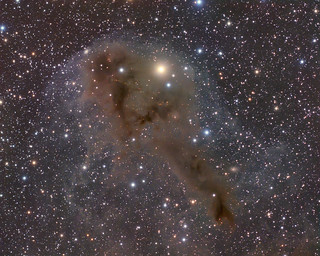 LDN1251
LDN1251 by
Carlos Uriarte, en Flickr
Re: Submissions: 2020 September
Posted: Tue Sep 22, 2020 4:32 pm
by KuriousGeorge
Ann wrote: ↑Tue Sep 22, 2020 5:41 am
That's a superb image! Thank you!

Ann
Thank you Ann! I just updated it with a new version that replaces Pixinsight's Photometric Color Calibration with a more traditional Color Calibration using the bright area of IC10 as a white balance. For this particular object, I believe this technique helps "cut through" the reddening effect caused by the Milky Way dust.
Re: Submissions: 2020 September
Posted: Tue Sep 22, 2020 4:44 pm
by idirsaci
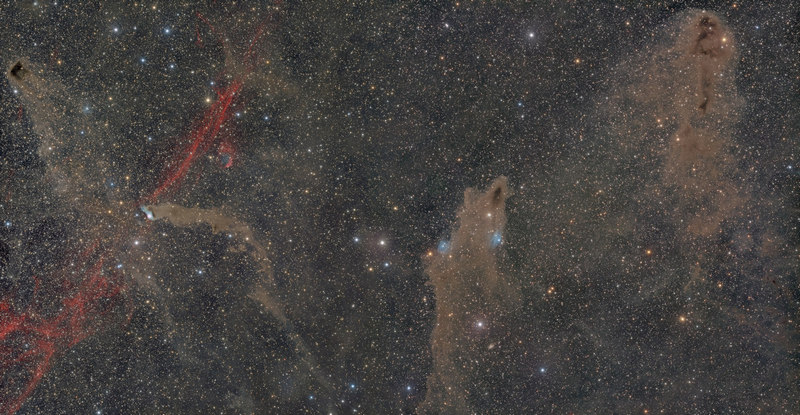 http://www.astrosurf.com/crepuscule/Per ... small2.jpg
http://www.astrosurf.com/crepuscule/Per ... small2.jpg
Name of the object: Dusty nebula in Cepheus (LBN,LDN,VDB).
Date: acquisition 2017-2020
Location: France, Alpes, Haute-Savoie at 1100m.
Setup : FSQ106 - Moravian G4 CCD (Kaf 16803) - EQ6 Pro Evolution
Autoguiding : PlaMx - Orion 80/400
Software : SkyX Pro - PixInsight - Photoshop
Sampling : 3.5 ''
Integration time : 44h10
L (141x600s = 23h30)
RVB (68x600s = 11h20)
Ha (28x1200s = 9h20)
Web site :
https://www.astrobin.com/users/Idir/
idir saci
Re: Submissions: 2020 September
Posted: Wed Sep 23, 2020 7:00 am
by olivierr31
Cygnus Wall - North America Nebula (NGC7000)
Tournefeuille, France
Acquisitions : August 18, September 11 & 12
Ha-SHO (Narrow band filters 6nm)
Bin1x1 Ha:4h56, Bin2x2 OIII:52mn & SII:56mn exposure time
200/1000 mm Newtonian telescope
Camera ZWO ASI1600MM Pro
Preprocessing with SIRIL
Image processing with Photoshop
Final touch with Lightroom
https://cdn.astrobin.com/thumbs/rZRiCWi ... XLOnwG.jpg
Full :
https://www.astrobin.com/54ahz0
Website :
https://astrophoto.pagesperso-orange.fr
Re: Submissions: 2020 September
Posted: Wed Sep 23, 2020 8:55 am
by javier_gl
M82, a starburst galaxy in Ursa Maior
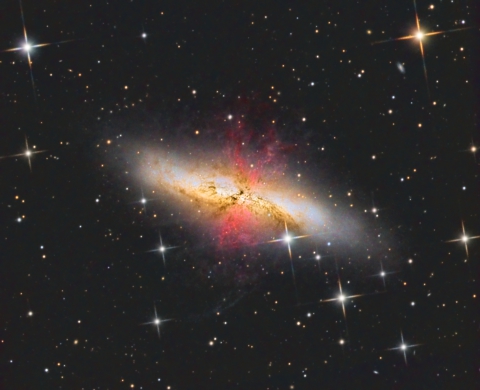
High-resolution image and technical data:
http://www.javierlaina.es/IMAGENES/M82.html
Javier Gómez Laina (Spain)
http://www.javierlaina.es/indexeng.html
Re: Submissions: 2020 September
Posted: Wed Sep 23, 2020 12:23 pm
by barretosmed
NGC 300
NGC 300 (also known as Caldwell 70) is a spiral galaxy in the constellation Sculptor.
It is 94,000 light-years in diameter, somewhat smaller than the Milky Way.
BEST DETAILS
https://www.astrobin.com/full/c8luny/B/?nc=user
EQUIPAMENTS:
NEW ZWO ASI 6200MC PRO COLED
Esprit 150mm
35 X 300 seg
Date: . 07/24/2020
Local: Munhoz - MG - Brazil
Processing and capture:
Software:PixInsight 1.8 PI 1.8, Photoshop CS6, Sequence genneration pro
Copyright: Fernando Oliveira de Menezes
Email:
Barretosmed@hotmail.com
Re: Submissions: 2020 September
Posted: Wed Sep 23, 2020 4:40 pm
by thecoldestnights
⠀
The Flames of Cygnus - a 104 megapixels mosaic (9 panels)
⠀
My first post here! 58 hours of Ha/OIII taken over the course of 2 months.
⠀
⠀
Full size and details can be found directly on my website :
https://thecoldestnights.com/2020/09/th ... of-cygnus/
You'll also find a Deep Zoom Image (DZI), feel free to zoom in!
Re: Submissions: 2020 September
Posted: Wed Sep 23, 2020 8:28 pm
by Robin_Onderka
California and Pleiades
Copyright: Robin Onderka |
www.instagram.com/robin_onderka
---
Date and Location: 09/21/2020 from Beskid Mountains
---
Canon 6D mod + Samyang 135/2
2 panels - 10 x 60" f/2.5 ISO 1600 per panel
SW: Astro Pixel Processor, PixInsight, Photoshop
 California and Pleiades
California and Pleiades by
Robin Onderka, on Flickr
Re: Submissions: 2020 September - 200 panel, 2.5 gigapixel Orion Constellation
Posted: Thu Sep 24, 2020 2:22 pm
by cosmicwreckingball
5 years in the making. 200 panels. 2.5 gigapixel image of the Orion Constellation.
Please click the image to see the full res (65,000x 39,000) as a deep zoom image.
Full Resolution DZI -
https://orion2020v5b.spaceforeverybody.com/
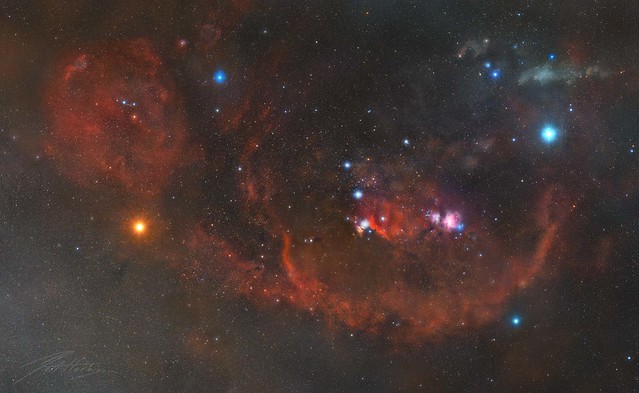
Re: Submissions: 2020 September
Posted: Thu Sep 24, 2020 2:44 pm
by markh@tds.net
NGC 1512
Copyright: Mark Hanson
I haven’t posted in quite some time -- crazy times all around. I’ve still been processing images and updating my website -- so here is NGC 1512. What a beautiful galaxy with its brilliant core and spider like arms. you can see the full version here:
https://www.hansonastronomy.com/ngc1512new
Thank you,
Mark
Re: Submissions: 2020 September
Posted: Thu Sep 24, 2020 4:46 pm
by Ann
markh@tds.net wrote: ↑Thu Sep 24, 2020 2:44 pm
NGC 1512
Copyright: Mark Hanson
I haven’t posted in quite some time -- crazy times all around. I’ve still been processing images and updating my website -- so here is NGC 1512. What a beautiful galaxy with its brilliant core and spider like arms. you can see the full version here:
https://www.hansonastronomy.com/ngc1512new
Thank you,
Mark
NGC1512-4Cropsmall2.jpg
NGC1512Thumb.jpg
Wow, Mark, those are two stunning pictures of one of my favorite galaxies, long and wide yellow barred NGC 1512 with its inner and outer ring, its long delicate narrow and somewhat tangled arms, some of them embracing its brilliantly blue and magnificently star forming neighbor, NGC 1510!
I love the picture of NGC 1512 with NGC 1510, and I love the closeup of NGC 1512!
Ann
Re: Submissions: 2020 September
Posted: Thu Sep 24, 2020 7:39 pm
by vchari252
Hi there! It's been rather cloudy here lately, so I took it upon myself to go through some old Hubble data and see what I can do.
Attached you will find my processing of HLA data of the protostar IRAS 20324+4057. I incorporated Ha data from IPHAS as well, seen in the faint blue clouds of Ha in the background of the image
This object has been selected as an APOD before(
https://apod.nasa.gov/apod/ap130904.html), but I feel this processing provides a unique view of the object, especially among the faint blue Ha clouds. In this image, 814W was mapped to orange, while 606W was mapped to Blue. Ha data was added as a cyan.

Re: Submissions: 2020 September
Posted: Thu Sep 24, 2020 7:44 pm
by sat333
Moon on the Furnace
On the occasion of International Observe the Moon Night 2020, I send a sequence of full moon in penumbral eclipse over an old furnace.
The factory produced bricks that were exported to many Mediterranean countries: much of Tripoli (Libya) after the 1911 war was built with this bricks. As evidence of that productive past, only ruins remain: "o Pisciuottu", so the ancient establishment is called by the locals; and in the inexorable passing of time, silently and discreetly disintegrating, the Furnace awaits its destiny.
Image data: June 05 2020
Camera: Sony ILCE-7M3;
Lens: Sigma 100-400;
Focal Length: 400mm Aperture: ƒ/6.3; Exposure ; ISO: 400;
stack of 5 shots
Location: 36.720588, 14.738648
Thanks
Re: Submissions: 2020 September
Posted: Thu Sep 24, 2020 11:34 pm
by markh@tds.net
Ann wrote: ↑Thu Sep 24, 2020 4:46 pm
markh@tds.net wrote: ↑Thu Sep 24, 2020 2:44 pm
NGC 1512
Copyright: Mark Hanson
I haven’t posted in quite some time -- crazy times all around. I’ve still been processing images and updating my website -- so here is NGC 1512. What a beautiful galaxy with its brilliant core and spider like arms. you can see the full version here:
https://www.hansonastronomy.com/ngc1512new
Thank you,
Mark
NGC1512-4Cropsmall2.jpg
NGC1512Thumb.jpg
Wow, Mark, those are two stunning pictures of one of my favorite galaxies, long and wide yellow barred NGC 1512 with its inner and outer ring, its long delicate narrow and somewhat tangled arms, some of them embracing its brilliantly blue and magnificently star forming neighbor, NGC 1510!
I love the picture of NGC 1512 with NGC 1510, and I love the closeup of NGC 1512!
Ann
Thank you Ann, glad you like it. I have done this image a few times, I like this one the best.





